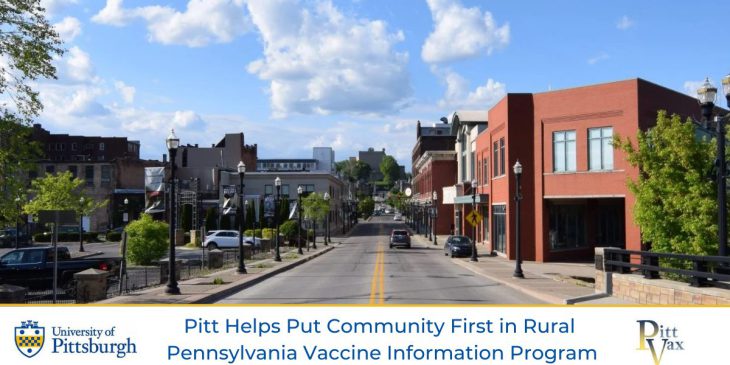Dr. Katherine Williams, faculty research instructor for the Pittsburgh Vaccination Research Group (PittVax), recently implemented the first phase of her ongoing program to combat COVID-19 vaccine misinformation in rural Pennsylvania. Williams and her team at the University of Pittsburgh started their project in Mercer and Lawrence counties, both of which, according to the Department of Health, have vaccination rates lower than their neighboring regions.
To ensure that she was meeting the needs of these communities, Williams enlisted the help of Mercer County community nurse Tracy Schliep, a native of rural Pennsylvania who chose to pursue a career in nursing after years of caring for her disabled sister. Now retired, Schliep has worked in a multitude of nursing roles and was lead coordinator for the Mercer County Health Equity Team, a collective of health care and community service providers working to address barriers to care.
“Unfortunately, negative news travels more efficiently than good news and such was the case when the COVID-19 vaccine became available to the public,” said Schliep. “When given another opportunity to help my community, I didn’t hesitate,” she said of partnering with PittVax.
With Schliep and her assistant, Erin Flaherty-Harris, at the lead, the PittVax team hosted a series of focus groups at a variety of community centers to better understand the community’s hesitancy surrounding the COVID-19 vaccine.
Using the Human-Centered Design (HCD) technique, the researchers gathered feedback on COVID-19 vaccinations and used that information to create targeted solutions to the problems expressed by the community.
With the data collected from a diverse population, Williams noticed that many members of the community were wary of online information and required physical materials with more reliable sources. She also discovered that in Lawrence County specifically, the Spanish-speaking population was being underserved and didn’t have proper access to information in their native tongue.
With the help of Pitt students majoring in marketing and Spanish, the team designed and distributed original, community-focused infographics addressing the most common concerns gathered from the focus groups. Williams also sought the help of Dr. José Francisco Abad, a UPMC a family medicine physician, to ensure that the materials included Spanish translations that were authentic to the community in need.
“I respect people’s right to self-determination”, Schliep said. “My goal is to provide resources so decisions being made are based on fact.”
Williams is hoping to extend the program to more of Pennsylvania’s rural communities within the next year. “Through these efforts we are seeing rural community leaders become empowered to act as local vaccine advocates,” said Williams. “Moving forward, we hope to involve additional training and further develop resources so rural residents feel confident making vaccine-related decisions.”
Williams presented this work and more about the program’s future at the Pitt Health Social Justice Education Summit on Feb. 28.








